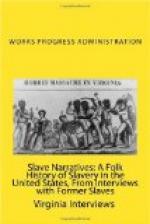Among the children of George Cox and his wife was Rev. John R. Cox, Col. who now lives in Catlettsburg, Kentucky, and is probably the only living ex-slave in this county.
After the Emancipation Proclamation, by President Lincoln, in 1865, John managed to get four years of schooling where he learned to read and write and become very proficient in arithmetic.
He says that had he had the opportunity to study that we have today he could have been the smartest man in the United States. He also says, that before freedom, the negroes in his neighborhood were allowed no books, if found looking at a book a slave was whipped unmercifully.
John’s master, in allowing his slaves to marry, was much more liberal than most other slave owners, who allowed their slaves no such liberty.
As a rule negro men were not allowed to marry at all, any attempt to mate with the negro women brought swift, sure horrible punishment and the species were propogated by selected male negroes, who were kept for that purpose, the owners of this privileged negro, charged a fee of one out of every four of his offspring for his services.
The employing class of Kentuckians, many of them descendants of slave owners, are prone to be reactionary in their attitude towards those who toil, this is reflected in low wages and inferior working conditions, a condition which affects both white and black labor alike, in many sections of the state. (Bibliography: Rev. John R. Cox (colored) Catlettsburg, Kentucky. Born 1852 (does not know day and month), Minister A.M.E. Church. First truant officer Catlettsburg, Kentucky. Interviewed Dec. 23, 1936.)
[Mrs. Duncan:]
“After the War was over mammie’s old man did not want us with them, so he threatened to kill us. Then my old mammie fixed us a little bundle of what few clothes we had and started us two children out to go back to the Campbell family in Albany. The road was just a wilderness and full of wild animals and varmints. Mammie gave us some powder and some matches, telling us to put a little down in the road every little while and set fire to it. This would scare the wild animals away from us.
“We got to the river at almost dark and some old woman set us across the river in a canoe. She let us stay all night wit her, and we went on to ‘Grandpap Campbells’’ (We always called him grandpap instead of master, as the others did.) When he saw us comin’ he said ’Lawd have mercy here comes them poor little chillun’.
“I stayed with them that time until I was big enough to be a house girl. Then I went to live with the Harrison family in Albany; and I lived with them till I married old Sam Duncan and come to Wayne County to live. I’ve raised a family of nine children and have thirty-seven grand children and twenty great grand children.




